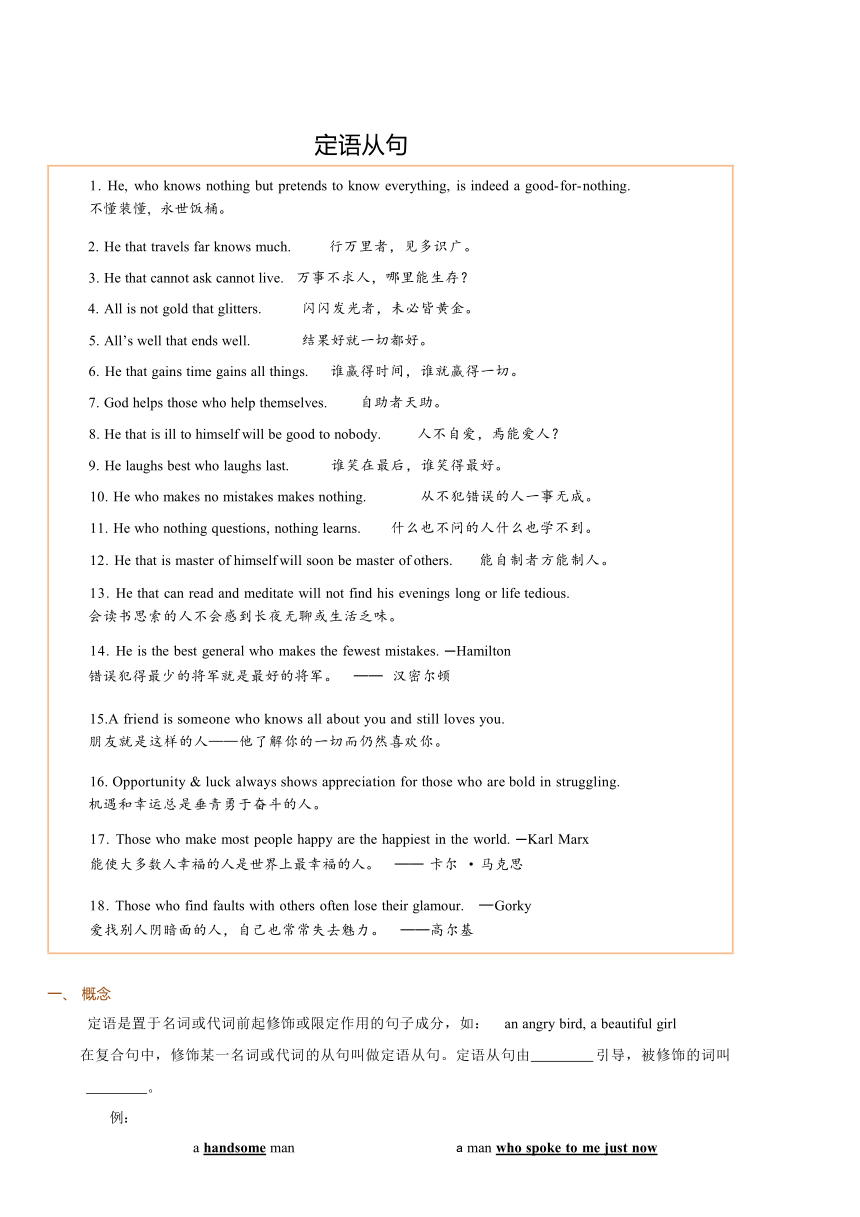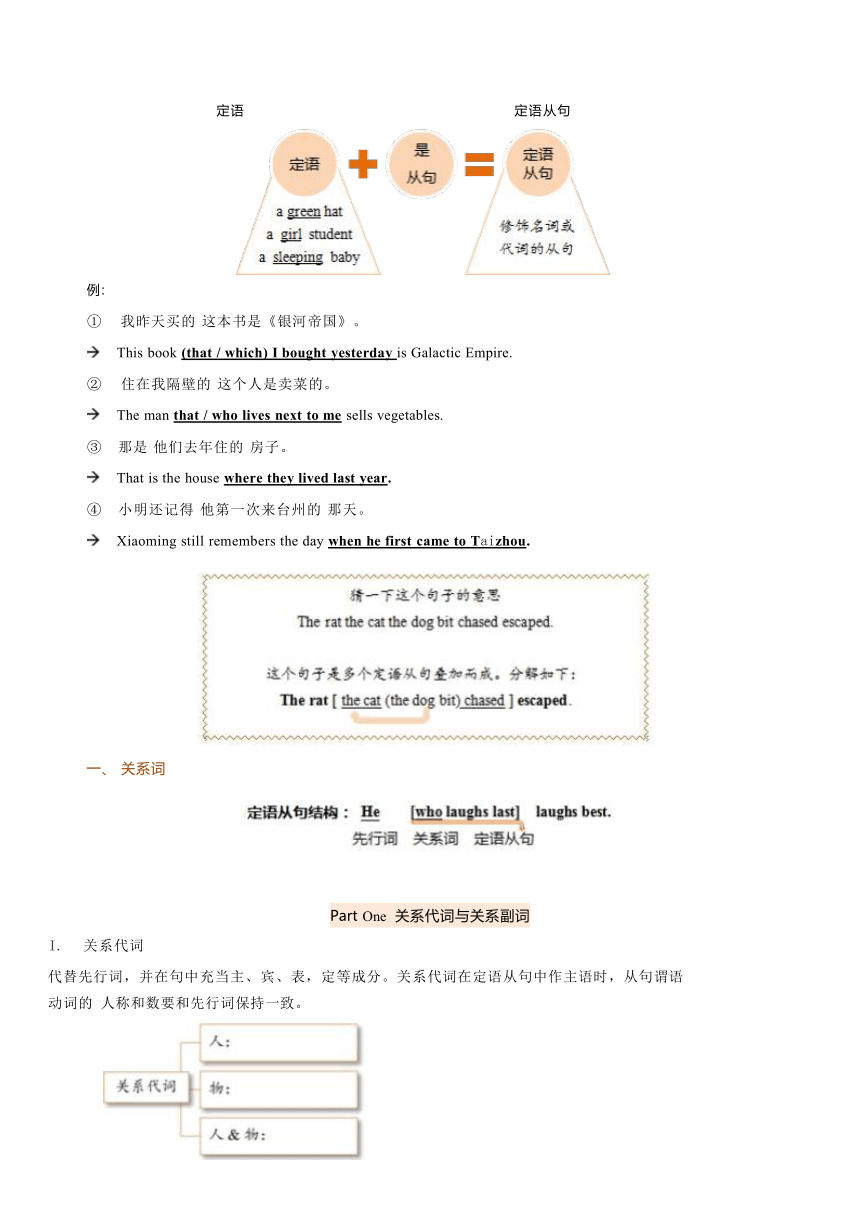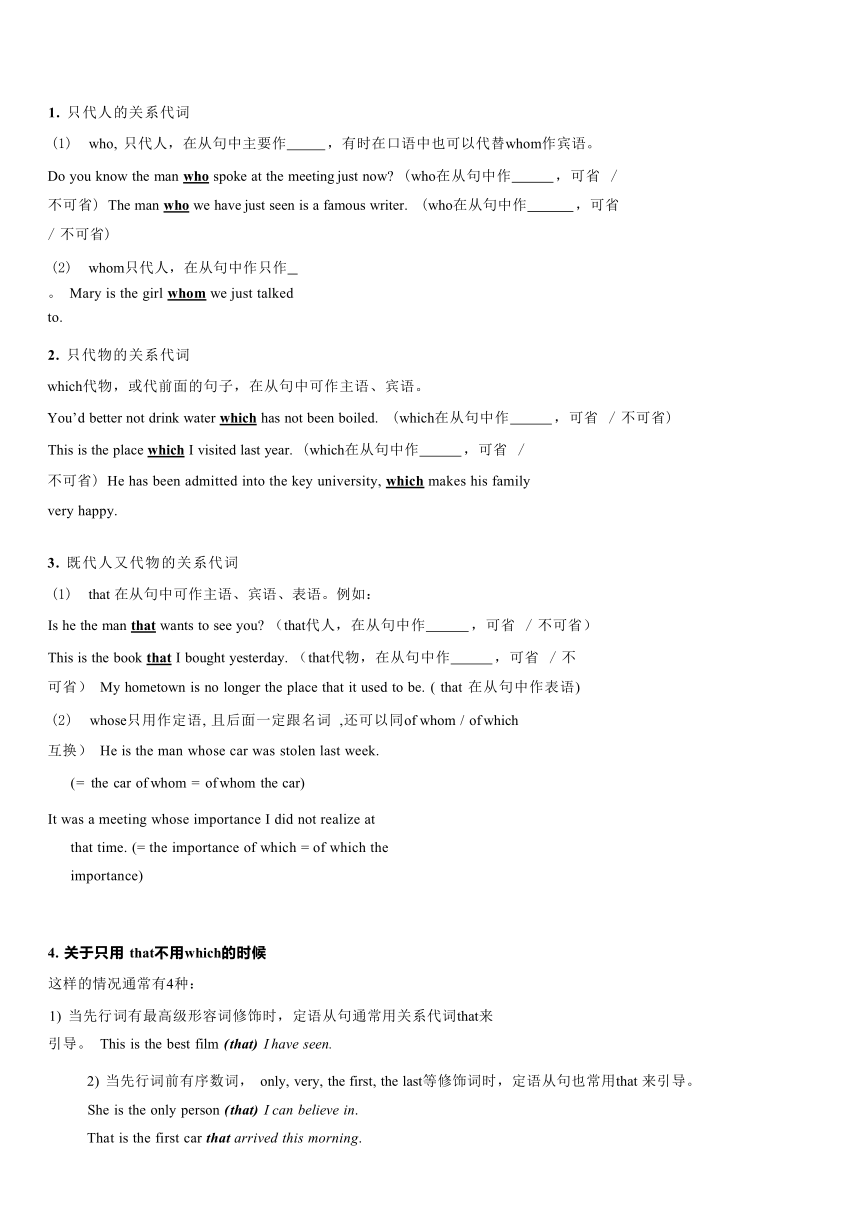人教版(2019)必修第一册Uni t4 Natural Disasters 定语从句 导学案(无答案)
文档属性
| 名称 | 人教版(2019)必修第一册Uni t4 Natural Disasters 定语从句 导学案(无答案) |  | |
| 格式 | docx | ||
| 文件大小 | 215.8KB | ||
| 资源类型 | 教案 | ||
| 版本资源 | 人教版(2019) | ||
| 科目 | 英语 | ||
| 更新时间 | 2024-11-13 06:38:56 | ||
图片预览



文档简介
定语从句
1. He, who knows nothing but pretends to know everything, is indeed a good-for-nothing. 不懂装懂, 永世饭桶。 2. He that travels far knows much. 行万里者,见多识广。 3. He that cannot ask cannot live. 万事不求人,哪里能生存? 4. All is not gold that glitters. 闪闪发光者,未必皆黄金。 5. All’s well that ends well. 结果好就一切都好。 6. He that gains time gains all things. 谁赢得时间,谁就赢得一切。 7. God helps those who help themselves. 自助者天助。 8. He that is ill to himself will be good to nobody. 人不自爱,焉能爱人? 9. He laughs best who laughs last. 谁笑在最后,谁笑得最好。 10. He who makes no mistakes makes nothing. 从不犯错误的人一事无成。 11. He who nothing questions, nothing learns. 什么也不问的人什么也学不到。 12. He that is master of himself will soon be master of others. 能自制者方能制人。 13. He that can read and meditate will not find his evenings long or life tedious. 会读书思索的人不会感到长夜无聊或生活乏味。 14. He is the best general who makes the fewest mistakes. ─Hamilton 错误犯得最少的将军就是最好的将军。 ── 汉密尔顿 15.A friend is someone who knows all about you and still loves you. 朋友就是这样的人——他了解你的一切而仍然喜欢你。 16. Opportunity & luck always shows appreciation for those who are bold in struggling. 机遇和幸运总是垂青勇于奋斗的人。 17. Those who make most people happy are the happiest in the world. ─Karl Marx 能使大多数人幸福的人是世界上最幸福的人。 ── 卡尔 · 马克思 18. Those who find faults with others often lose their glamour. ─Gorky 爱找别人阴暗面的人,自己也常常失去魅力。 ──高尔基
一、 概念
定语是置于名词或代词前起修饰或限定作用的句子成分,如: an angry bird, a beautiful girl
在复合句中,修饰某一名词或代词的从句叫做定语从句。定语从句由 引导,被修饰的词叫
。
例:
a handsome man a man who spoke to me just now
定语 定语从句
例:
① 我昨天买的 这本书是《银河帝国》。
This book (that / which) I bought yesterday is Galactic Empire.
② 住在我隔壁的 这个人是卖菜的。
The man that / who lives next to me sells vegetables.
③ 那是 他们去年住的 房子。
That is the house where they lived last year.
④ 小明还记得 他第一次来台州的 那天。
Xiaoming still remembers the day when he first came to Taizhou.
一、 关系词
Part One 关系代词与关系副词
I. 关系代词
代替先行词,并在句中充当主、宾、表,定等成分。关系代词在定语从句中作主语时,从句谓语动词的 人称和数要和先行词保持一致。
1. 只代人的关系代词
(1) who, 只代人,在从句中主要作 ,有时在口语中也可以代替whom作宾语。
Do you know the man who spoke at the meeting just now (who在从句中作 ,可省 / 不可省) The man who we have just seen is a famous writer. (who在从句中作 ,可省 / 不可省)
(2) whom只代人,在从句中作只作 。 Mary is the girl whom we just talked to.
2. 只代物的关系代词
which代物,或代前面的句子,在从句中可作主语、宾语。
You’d better not drink water which has not been boiled. (which在从句中作 ,可省 / 不可省)
This is the place which I visited last year. (which在从句中作 ,可省 / 不可省) He has been admitted into the key university, which makes his family very happy.
3. 既代人又代物的关系代词
(1) that 在从句中可作主语、宾语、表语。例如:
Is he the man that wants to see you (that代人,在从句中作 ,可省 / 不可省)
This is the book that I bought yesterday. (that代物,在从句中作 ,可省 / 不可省) My hometown is no longer the place that it used to be. ( that 在从句中作表语)
(2) whose只用作定语, 且后面一定跟名词 ,还可以同of whom / of which互换) He is the man whose car was stolen last week.
(= the car of whom = of whom the car)
It was a meeting whose importance I did not realize at that time. (= the importance of which = of which the importance)
4. 关于只用 that不用which的时候
这样的情况通常有4种:
1) 当先行词有最高级形容词修饰时,定语从句通常用关系代词that来引导。 This is the best film (that) I have seen.
2) 当先行词前有序数词, only, very, the first, the last等修饰词时,定语从句也常用that 来引导。
She is the only person (that) I can believe in. That is the first car that arrived this morning.
3) 当先行词之前有不定代词all, any, every, no等词时,其后的定语从句常用that 来引导。 All the people that come from the country work much harder.
This is all (that) I can tell you.
4) 当先行词既指人有指事物的时候。
He is not interested in the people and the things that he saw in the market. Ⅱ. 关系副词
试填写
1. I still remember the day we visited the factory and the day we spent together.
2. The factory we visited is different from the factory his father works
3. I forgot the reason he told me, so I don’t know the reason he was upset.
(
Part
T
wo
介词
+
which
/
whom
)
这些句子也可说成:
(1) The person to whom you should write is Mr. Brown.
(2) That house in which they are living belongs to me.
(3) The day on which my sister was born is March, 1999.
(4) She showed me the dictionary for which she paid a lot money.
(5) The man to whom you spoke last night is my father.
注意:
① 在第2句中的介词in 如果要前置放到关系词前面,
不能写成: That house in that they are living belongs to me. 应该写成:
That house in which they are living belongs to me.
② 含有介词的短语动词一般不拆开,介词仍放在短语动词的后面。如: look for, look after, take care of 等。
This is the watch (which / that) I am looking for. (正) This is the watch for which I am looking. (误)
注:关于 “介词 + whose + 名词”结构
The boss went to the hospital. + Mr. King worked in the boss’s company.
The boss, in whose company Mr. King worked, went to the hospital.
Part Three限制性定语从句和非限制性定语从句 非限制性定语从句 (非限制性定语从句也称为非限定性定语从句)
非限制性定语从句中从句和主句间往往用逗号隔开这一特征,而且要注意,在非限制性定语从句中 的关系词不用that, 如
Yesterday I met Li Ping, who seemed to be very busy.
The dam, which is the biggest in the world, is 3800 metres long.
The workers, some of whom stayed for four years, came from different countries.
1. 限制性定语从句和主句关系密切 ,如果省略了 ,主句的意思不明确 ,而且 ,主句和从句之间 不用逗号分开 。而非限制性定语从句则不同。
This is the best novel that I have read.
This is a good novel, which is famous and popular. 又如:
She has a son who studies in Britain.
限制性定语从句的先行词总是一个名词或代词 ,而非限制性定语从句的先行词可以是一个 词 ,也可以是部分或整个主句 。此时一般由关系代词which或as来引导 。如:
Jenny was late again, which made her teacher angry. My wife is patient with my son, which I am seldom. I am good at English, as you know.
As he pointed out, your words were wrong.(as 引导非限制性定语从句时,可以在主句的前或 后。)
公 ·用which代替整个句子的用法
The bamboo is hollow, which makes it very light.
Tom was playing his game boy, which made his teacher quite angry. 必 ·as和which的用法
as 引导定语从句主要用于非限制性定语从句和the same…as ,such…as ,的结构中。
(1) as与which都可以引导一个非限制性定语从句,并代表前面整个句子或主句中的表语。 He married the girl ,as(which) was natural.
He seemed a foreigner, as(which) in fact he was.
不同的是: as 引导的定语从句可以前置 ,而which不行。 As was natural, he married the girl.
As we know, the earth is round.
(2) 在the same…as, such…as,结构中, same, such,之后应是名词。 We are facing the same problems as we did years ago.
We hope to get such a tool as he is using.
这些结构也可以用which改写。但要去掉这种结构,不能直接用which代替as 。
以上两句分别可以改写 成:
We are facing the problems which we faced years ago. We hope to get the tool which he is using.
注意: the same…as与the same…that引导的定语从句在意义上的区别是:前者修饰的是与原物同样的; 而后者修饰的就是先行词同样的东西。试比较:
This is the same watch as I lost. 这和我丢失的那一只表一样。(不是同一只) This is the same watch that I lost. 这就是我丢失的那一只表。(同一只)
关系代词与关系副词
I will never forget the days I spent with my cousins in the countryside.
2. I will never forget the days ______ I worked with my cousins on the farm.
介词+which/whom
1. More and more people are learning English, the importance has drawn much attention of the public.
2. American women usually identify their best friends as someone they can talk frequently.
3. She heard the terrible noise, brought her heart into her mouth.
4. Dorothy was always speaking highly of her role in the play, of course, made the others unhappy.
5. He is not such a man would leave his work half done.
二、关系词填空
1. I still remember the night I first came to the house.
2. I’ll never forget the day we met each other last week.
3. Mr. Black is going to Beijing in October, is the best season there.
4. This is the school I used to study.
5. Do you still remember the place we visited last week
6. Do you still remember the place we visited the painting exhibition
7. I live in Beijing, is the capital of China.
8. There was a time there were slaves in the USA.
9. It was in the street I met John yesterday.
10. This is the very novel about we’ve talked so much.
1. He, who knows nothing but pretends to know everything, is indeed a good-for-nothing. 不懂装懂, 永世饭桶。 2. He that travels far knows much. 行万里者,见多识广。 3. He that cannot ask cannot live. 万事不求人,哪里能生存? 4. All is not gold that glitters. 闪闪发光者,未必皆黄金。 5. All’s well that ends well. 结果好就一切都好。 6. He that gains time gains all things. 谁赢得时间,谁就赢得一切。 7. God helps those who help themselves. 自助者天助。 8. He that is ill to himself will be good to nobody. 人不自爱,焉能爱人? 9. He laughs best who laughs last. 谁笑在最后,谁笑得最好。 10. He who makes no mistakes makes nothing. 从不犯错误的人一事无成。 11. He who nothing questions, nothing learns. 什么也不问的人什么也学不到。 12. He that is master of himself will soon be master of others. 能自制者方能制人。 13. He that can read and meditate will not find his evenings long or life tedious. 会读书思索的人不会感到长夜无聊或生活乏味。 14. He is the best general who makes the fewest mistakes. ─Hamilton 错误犯得最少的将军就是最好的将军。 ── 汉密尔顿 15.A friend is someone who knows all about you and still loves you. 朋友就是这样的人——他了解你的一切而仍然喜欢你。 16. Opportunity & luck always shows appreciation for those who are bold in struggling. 机遇和幸运总是垂青勇于奋斗的人。 17. Those who make most people happy are the happiest in the world. ─Karl Marx 能使大多数人幸福的人是世界上最幸福的人。 ── 卡尔 · 马克思 18. Those who find faults with others often lose their glamour. ─Gorky 爱找别人阴暗面的人,自己也常常失去魅力。 ──高尔基
一、 概念
定语是置于名词或代词前起修饰或限定作用的句子成分,如: an angry bird, a beautiful girl
在复合句中,修饰某一名词或代词的从句叫做定语从句。定语从句由 引导,被修饰的词叫
。
例:
a handsome man a man who spoke to me just now
定语 定语从句
例:
① 我昨天买的 这本书是《银河帝国》。
This book (that / which) I bought yesterday is Galactic Empire.
② 住在我隔壁的 这个人是卖菜的。
The man that / who lives next to me sells vegetables.
③ 那是 他们去年住的 房子。
That is the house where they lived last year.
④ 小明还记得 他第一次来台州的 那天。
Xiaoming still remembers the day when he first came to Taizhou.
一、 关系词
Part One 关系代词与关系副词
I. 关系代词
代替先行词,并在句中充当主、宾、表,定等成分。关系代词在定语从句中作主语时,从句谓语动词的 人称和数要和先行词保持一致。
1. 只代人的关系代词
(1) who, 只代人,在从句中主要作 ,有时在口语中也可以代替whom作宾语。
Do you know the man who spoke at the meeting just now (who在从句中作 ,可省 / 不可省) The man who we have just seen is a famous writer. (who在从句中作 ,可省 / 不可省)
(2) whom只代人,在从句中作只作 。 Mary is the girl whom we just talked to.
2. 只代物的关系代词
which代物,或代前面的句子,在从句中可作主语、宾语。
You’d better not drink water which has not been boiled. (which在从句中作 ,可省 / 不可省)
This is the place which I visited last year. (which在从句中作 ,可省 / 不可省) He has been admitted into the key university, which makes his family very happy.
3. 既代人又代物的关系代词
(1) that 在从句中可作主语、宾语、表语。例如:
Is he the man that wants to see you (that代人,在从句中作 ,可省 / 不可省)
This is the book that I bought yesterday. (that代物,在从句中作 ,可省 / 不可省) My hometown is no longer the place that it used to be. ( that 在从句中作表语)
(2) whose只用作定语, 且后面一定跟名词 ,还可以同of whom / of which互换) He is the man whose car was stolen last week.
(= the car of whom = of whom the car)
It was a meeting whose importance I did not realize at that time. (= the importance of which = of which the importance)
4. 关于只用 that不用which的时候
这样的情况通常有4种:
1) 当先行词有最高级形容词修饰时,定语从句通常用关系代词that来引导。 This is the best film (that) I have seen.
2) 当先行词前有序数词, only, very, the first, the last等修饰词时,定语从句也常用that 来引导。
She is the only person (that) I can believe in. That is the first car that arrived this morning.
3) 当先行词之前有不定代词all, any, every, no等词时,其后的定语从句常用that 来引导。 All the people that come from the country work much harder.
This is all (that) I can tell you.
4) 当先行词既指人有指事物的时候。
He is not interested in the people and the things that he saw in the market. Ⅱ. 关系副词
试填写
1. I still remember the day we visited the factory and the day we spent together.
2. The factory we visited is different from the factory his father works
3. I forgot the reason he told me, so I don’t know the reason he was upset.
(
Part
T
wo
介词
+
which
/
whom
)
这些句子也可说成:
(1) The person to whom you should write is Mr. Brown.
(2) That house in which they are living belongs to me.
(3) The day on which my sister was born is March, 1999.
(4) She showed me the dictionary for which she paid a lot money.
(5) The man to whom you spoke last night is my father.
注意:
① 在第2句中的介词in 如果要前置放到关系词前面,
不能写成: That house in that they are living belongs to me. 应该写成:
That house in which they are living belongs to me.
② 含有介词的短语动词一般不拆开,介词仍放在短语动词的后面。如: look for, look after, take care of 等。
This is the watch (which / that) I am looking for. (正) This is the watch for which I am looking. (误)
注:关于 “介词 + whose + 名词”结构
The boss went to the hospital. + Mr. King worked in the boss’s company.
The boss, in whose company Mr. King worked, went to the hospital.
Part Three限制性定语从句和非限制性定语从句 非限制性定语从句 (非限制性定语从句也称为非限定性定语从句)
非限制性定语从句中从句和主句间往往用逗号隔开这一特征,而且要注意,在非限制性定语从句中 的关系词不用that, 如
Yesterday I met Li Ping, who seemed to be very busy.
The dam, which is the biggest in the world, is 3800 metres long.
The workers, some of whom stayed for four years, came from different countries.
1. 限制性定语从句和主句关系密切 ,如果省略了 ,主句的意思不明确 ,而且 ,主句和从句之间 不用逗号分开 。而非限制性定语从句则不同。
This is the best novel that I have read.
This is a good novel, which is famous and popular. 又如:
She has a son who studies in Britain.
限制性定语从句的先行词总是一个名词或代词 ,而非限制性定语从句的先行词可以是一个 词 ,也可以是部分或整个主句 。此时一般由关系代词which或as来引导 。如:
Jenny was late again, which made her teacher angry. My wife is patient with my son, which I am seldom. I am good at English, as you know.
As he pointed out, your words were wrong.(as 引导非限制性定语从句时,可以在主句的前或 后。)
公 ·用which代替整个句子的用法
The bamboo is hollow, which makes it very light.
Tom was playing his game boy, which made his teacher quite angry. 必 ·as和which的用法
as 引导定语从句主要用于非限制性定语从句和the same…as ,such…as ,的结构中。
(1) as与which都可以引导一个非限制性定语从句,并代表前面整个句子或主句中的表语。 He married the girl ,as(which) was natural.
He seemed a foreigner, as(which) in fact he was.
不同的是: as 引导的定语从句可以前置 ,而which不行。 As was natural, he married the girl.
As we know, the earth is round.
(2) 在the same…as, such…as,结构中, same, such,之后应是名词。 We are facing the same problems as we did years ago.
We hope to get such a tool as he is using.
这些结构也可以用which改写。但要去掉这种结构,不能直接用which代替as 。
以上两句分别可以改写 成:
We are facing the problems which we faced years ago. We hope to get the tool which he is using.
注意: the same…as与the same…that引导的定语从句在意义上的区别是:前者修饰的是与原物同样的; 而后者修饰的就是先行词同样的东西。试比较:
This is the same watch as I lost. 这和我丢失的那一只表一样。(不是同一只) This is the same watch that I lost. 这就是我丢失的那一只表。(同一只)
关系代词与关系副词
I will never forget the days I spent with my cousins in the countryside.
2. I will never forget the days ______ I worked with my cousins on the farm.
介词+which/whom
1. More and more people are learning English, the importance has drawn much attention of the public.
2. American women usually identify their best friends as someone they can talk frequently.
3. She heard the terrible noise, brought her heart into her mouth.
4. Dorothy was always speaking highly of her role in the play, of course, made the others unhappy.
5. He is not such a man would leave his work half done.
二、关系词填空
1. I still remember the night I first came to the house.
2. I’ll never forget the day we met each other last week.
3. Mr. Black is going to Beijing in October, is the best season there.
4. This is the school I used to study.
5. Do you still remember the place we visited last week
6. Do you still remember the place we visited the painting exhibition
7. I live in Beijing, is the capital of China.
8. There was a time there were slaves in the USA.
9. It was in the street I met John yesterday.
10. This is the very novel about we’ve talked so much.
